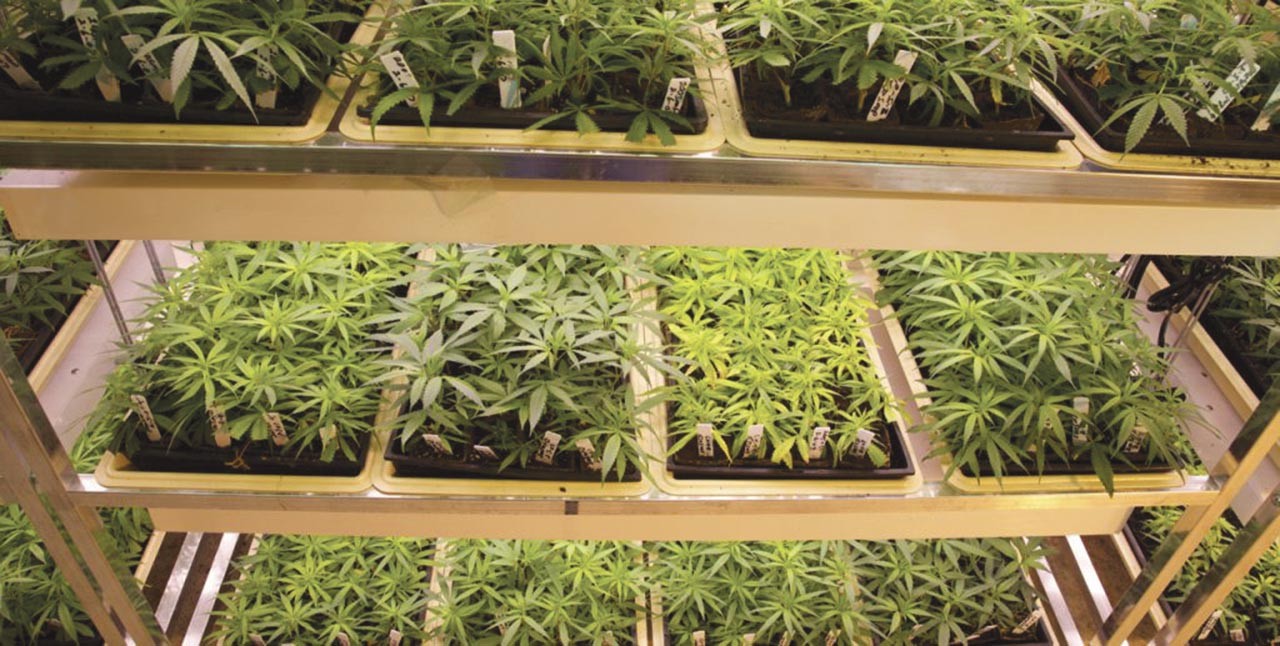
When cannabis researcher Van Butsic meets with a pot grower, it usually happens at a neutral location, like a restaurant or a coffeeshop. That’s because Butsic, co-director of the UC Berkeley Cannabis Research Center, doesn’t want the feds coming after him.
“I talk to a ton of growers, but usually not in their fields,” Butsic said. He talks to them about their water usage, minimizing pests, and other environmental issues. But he’s careful not to get near any actual cannabis plants. “I have to be cautious about that kind of interaction,” he said.
The Cannabis Research Center relies on federal funding for its work. Cannabis is still illegal at the federal level, despite states across the country legalizing or decriminalizing it. That has caused all manner of problems for the legal cannabis industry. For instance, most banks won’t do business with legal cannabis companies; interstate commerce is forbidden; and though the feds have mostly backed off prosecutions, the threat of a DEA raid always looms.
But it’s among pot researchers, especially at universities, where the ludicrousness of operating in an industry that is at once legal and felonious is perhaps most starkly revealed. To get needed federal grants, researchers must adhere to federal law. Hence the perverseness of a cannabis researcher disallowed from being around cannabis. “We have zero interaction with the plant, partly because of the federal restrictions,” Butsic said.
It’s also partly because the Cannabis Research Center concerns itself mainly with the ecological, social, and cultural aspects of the pot business. It doesn’t do lab testing. For research outfits that do, the situation is even more challenging.
Those research centers, several of which are housed in California universities, must adhere to a strict set of regulations. For one thing, they are required to get the cannabis they test from one designated source: the National Institute of Drug Abuse, which administers a farm at the University of Mississippi. The problem is that the pot grown on that farm “is inferior weed,” said Bob Solomon, a law professor and co-chair of UC Irvine’s Center for the Study of Cannabis. The feds’ pot, he said, has “one-third the potency of street cannabis, which means that we are not researching the product that is actually used.”
The pot that comes from the NIDA farm has been reported to be sometimes tainted with mold, and is often full of leaf, stems and even seeds, making it sound like the pot ’70s stoners cleaned using the gatefold of Led Zeppelin IV.
Thus, California researchers, surrounded by some of the best pot in the world, much of it legal according to the state, have to rely on substandard cannabis shipped from Mississippi for testing. If a researcher wants to know if a particular component of pot (THC, CBD, any of an array of other cannabinoids or terpenes) has a particular effect on human health, he or she might be out of luck, because the Mississippi pot might contain very little of the desired component, or none at all.
The Drug Enforcement Administration had promised to help alleviate this situation by issuing licenses to private growers that would allow them to legally supply researchers with higher-quality cannabis. But as the health-news site Stat observed last week, it’s been three years since the DEA’s promise, and not a single license has been issued.
And the DEA isn’t the only problem. Onerous regulations from the Food and Drug Administration stymie research efforts, too. Ziva Cooper, research director at UCLA’s Cannabis Research Initiative, said she is not allowed to study CBD unless it’s extracted from hemp, because the FDA requires that only pharmaceutical-grade products may be tested when they’re extracted from marijuana. Such products are, at best, hard to come by. CBD, unlike THC, is non-intoxicating, but that doesn’t matter to the FDA: if it came from a plant that contains THC, it’s illegal (hemp contains only trace amounts of THC, and was legalized federally in last year’s farm bill).
Federal restrictions keep Cooper from studying a whole range of products in the ever-evolving cannabis market. For instance, things like dabs and waxes — highly concentrated extracts from the cannabis plant with extremely high amounts of THC in them — are verboten. “These are potentially very dangerous substances, but we can’t study them,” Cooper said.
It all comes down to funding. “It’s very difficult to submit a grant proposal,” Cooper said. The process is even more challenging when a researcher has to convince grantors — in the government or not — that what you’re doing passes legal muster. Just the word “cannabis” turns many of them off. “We’re talking about millions of dollars” for any given study, Cooper said.
Even for Berkeley’s Butsic, who doesn’t do lab work, the confusing morass of regulations is a major stumbling block. If pot were legal, none of this would be an issue, he said. He would like to determine, for example, how much water should be used to grow cannabis plants. Incredibly, there is no formal, definitive answer to that question. But he can’t research it. Or at least he’s pretty sure he can’t. That’s one of the problems. “The lines are so ill-defined,” he said.











